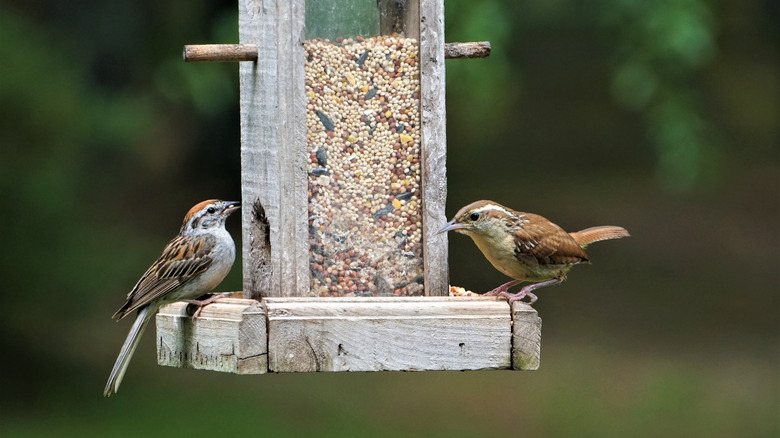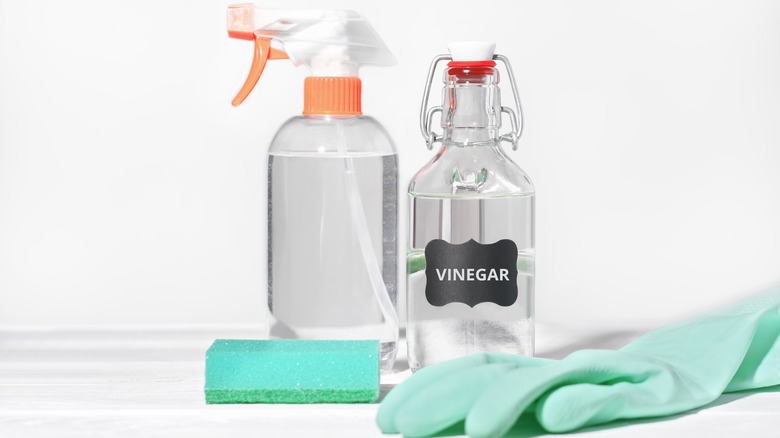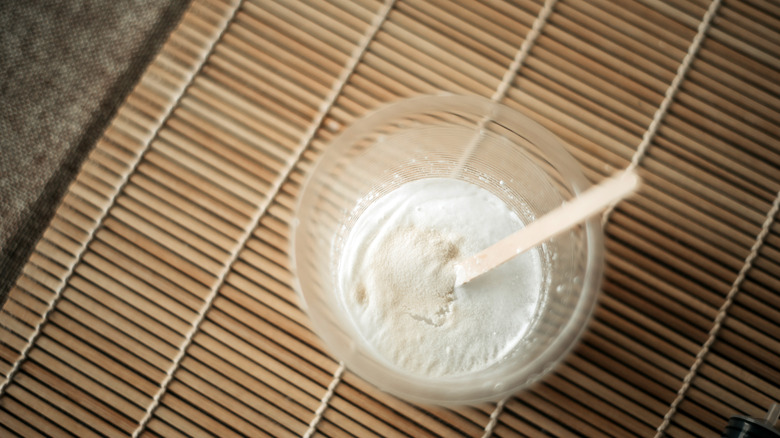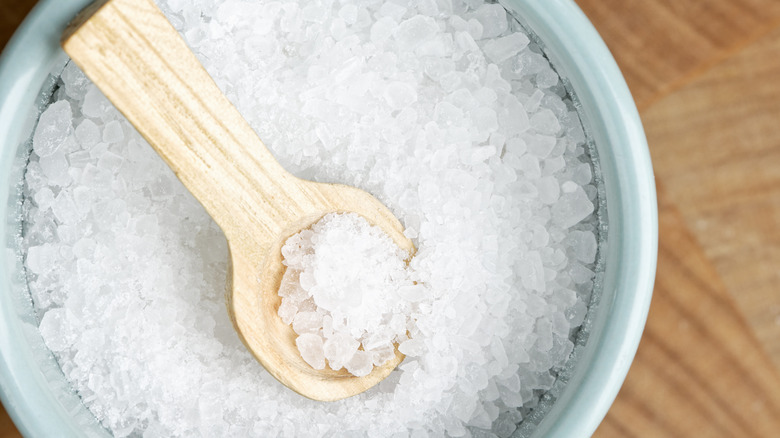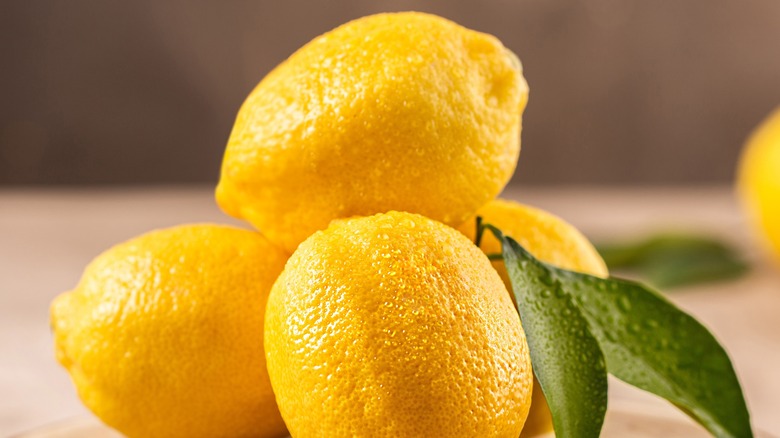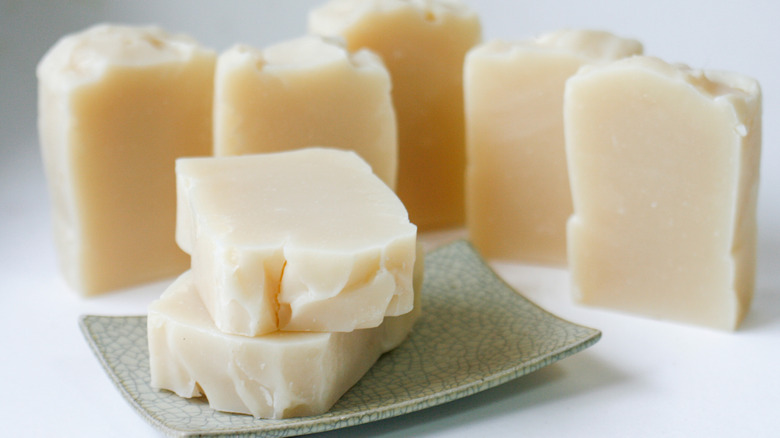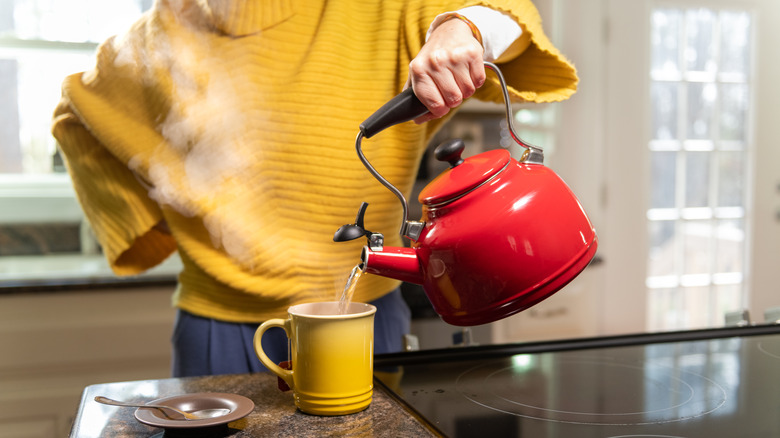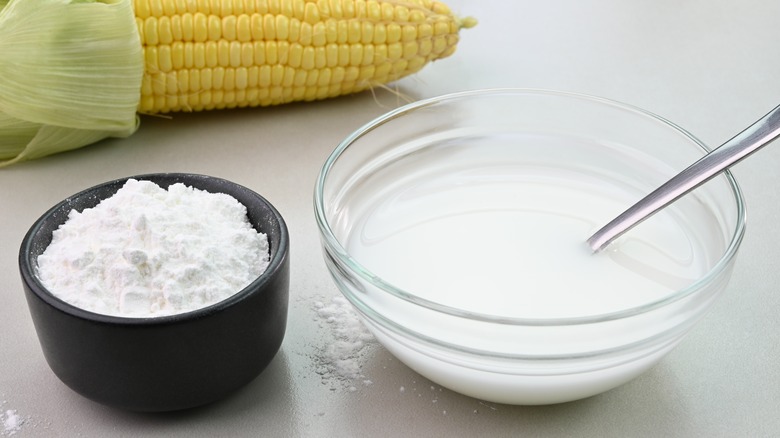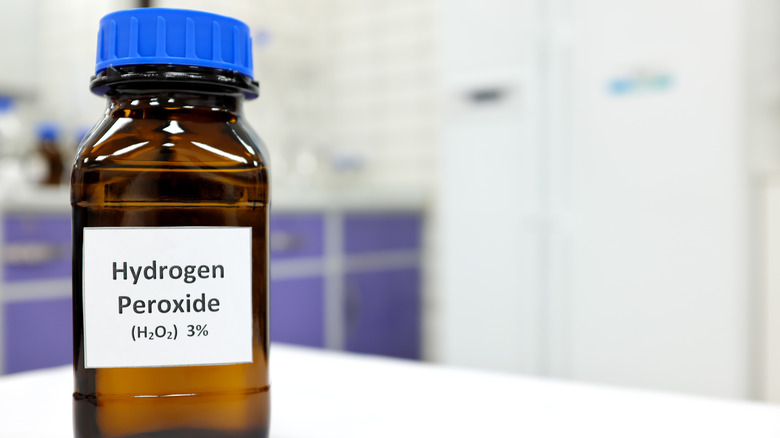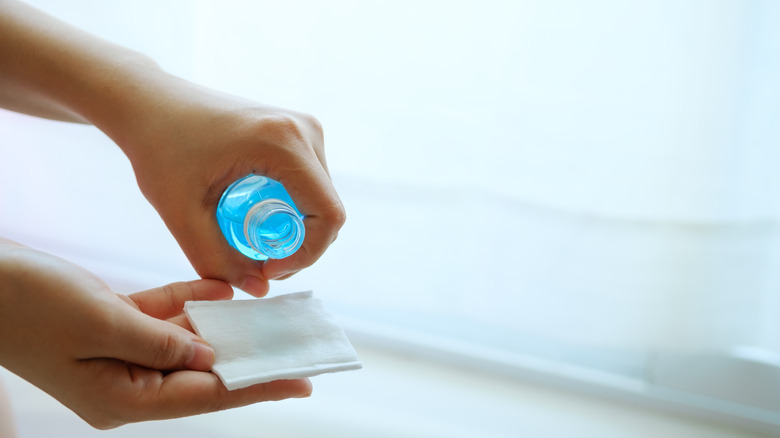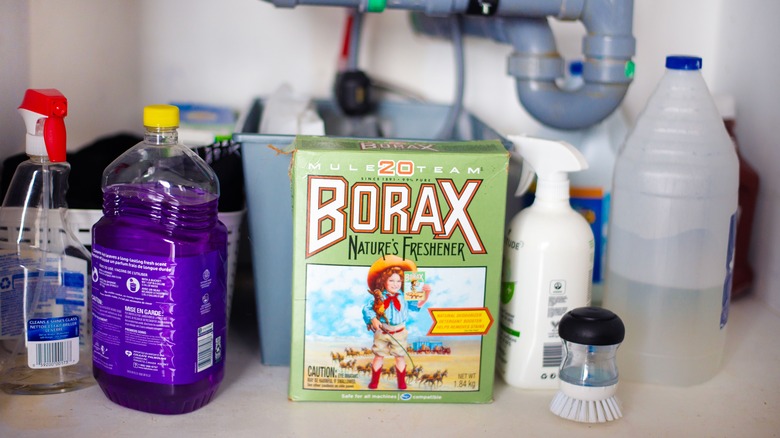Natural Ingredients You Should Be Using To Clean Your Bird Feeder
When you set up a bird feeder in your garden, it becomes a hub of activity, not just for the birds but also for a variety of germs and bacteria. A well-frequented bird feeder can quickly accumulate a mix of bird droppings, mold, old food, and other debris. This accumulation isn't just unsightly; it can be a breeding ground for harmful microbes. Common germs like salmonella and E. coli can thrive in unclean feeders, posing a health risk. Moreover, mold growth, often spurred by damp conditions and decaying organic matter, can lead to respiratory issues in birds. This highlights the critical need for regular and effective cleaning of bird feeders. The Cornell Lab of Ornithology often emphasizes the importance of maintaining hygienic feeding stations to protect bird health. They advise cleaning the feeder around once every two weeks.
However, birds are incredibly sensitive to their environment, particularly to harsh chemicals found in conventional cleaning agents, which can easily harm their delicate respiratory systems. Even traces of these chemicals can be detrimental, considering that birds often peck at their surroundings. Therefore, having natural cleaning ingredients on hand is important. The use of natural cleaning agents like distilled vinegar, baking soda, and lemon juice offers a safe yet effective alternative. Leading bird conservation organizations, such as the Best Friend's Animal Society, stress the importance of using bird-safe cleaning products. Apparently, humans usually absorb about 30% of the air they breathe, but birds are much more efficient. This makes it especially important to keep their environment clean, as they are more affected by airborne particles and pollutants.
Distilled vinegar can kill molds and remove grime
When maintaining a clean bird feeder, distilled vinegar emerges as a standout choice. This is thanks to the natural cleaning properties of vinegar. To use it effectively, a simple yet efficient approach is to create a mixture of 1 part vinegar and 4 parts hot water. This solution can be used to soak the feeder or applied directly for scrubbing. Primarily comprised of acetic acid, vinegar is celebrated for its antimicrobial capabilities, making it an effective agent against various bacteria. This characteristic of vinegar is particularly advantageous for bird feeders, where the prevention of mold growth is crucial. Mold can be harmful to birds, and vinegar's ability to combat this issue is invaluable. The acetic acid in vinegar works wonders at breaking down mold spores and grime. It's the acid's nature to penetrate and dissolve these stubborn substances, making your cleaning task easier and more effective.
Although studies support its antimicrobial properties, it may not kill all germs. You need to ensure that your bird feeder is not just visually clean but also hygienically safe. So it might help to combine it with other natural options. Nevertheless, the safety of vinegar as a cleaning agent for bird feeders cannot be overstated. It's far less likely to leave harmful residues, unlike chemical cleaners — a vital consideration given that birds will be in direct contact with the cleaned surfaces.
Baking soda has gentle abrasive properties to lift hardened particles
To harness the full potential of baking soda, you can use it as a gentle scrub. Just sprinkle it over the surface of the feeder. Scientifically known as sodium bicarbonate, baking soda is a hidden gem in the world of natural cleaning agents. Its gentle yet effective cleaning properties stem from its mild alkalinity. Furthermore, its mild, gritty texture is an excellent choice for lifting hardened particles, providing just the right amount of abrasiveness. This cleaning attribute of baking soda is not just useful for household cleaning but also plays a significant role in maintaining bird feeders, where residue buildup is a common problem. It can act as a gentle scrubbing agent, helping to dislodge dried-on birdseed, droppings, and other stubborn residues that can accumulate over time.
Moreover, baking soda is renowned for its deodorizing properties. This is particularly beneficial for bird feeders, as it helps neutralize any unpleasant odors, ensuring a more inviting environment for your feathered visitors. Another significant advantage of using baking soda is its safety profile. It's a non-toxic substance, making it an ideal cleaning agent for bird feeders.
Coarse salt can be used as a gentle abrasive and sterilizer
Coarse salt, another staple in our kitchens, is surprisingly adept as a cleaning agent. You can sprinkle some salt on the feeder and then scrub it with a damp cloth. This method works because some salts have a microsized granular texture that makes them effective for cleaning. These granules act as a mild abrasive, perfect for scrubbing away accumulated dirt, grime, and residue on bird feeders. This is especially useful for removing those stubborn spots where bird droppings or wet seeds might have clung to the feeder.
But it's not just the abrasive quality that makes salt a good cleaning agent. Salt is also known for its natural sterilizing and disinfecting properties. A 2006 study published in the journal Food Microbiology revealed that salt can be lethal to certain bacteria. Apparently, it can extract water from them, a process known as osmosis. Water moves out of the bacterial cell to equalize salt levels on both sides of its cell membrane. As the bacterium loses water, its critical proteins, like enzymes, stop functioning. This leads to the cell's eventual implosion. It's quite remarkable how a basic substance like salt can profoundly affect microscopic life forms. Indeed, this makes salt not just a culinary essential but also a valuable tool in your bird feeder maintenance kit.
The acidity of lemon juice can help break down dirt
A solution of lemon juice is particularly beneficial for copper bird feeders. Lemon juice, a natural and readily available ingredient, has citric acid as its key component, which helps with its cleaning prowess. It can break down and dissolve dirt and grime, leaving your feeder looking and feeling fresh. But lemon juice isn't just about effective cleaning; it also has natural antibacterial and antifungal properties. A 2020 study published in the Eurasian Journal of Forest Science revealed the antimicrobial effects of citric acid and its powerful ability to eliminate bacteria like Escherichia coli and Staphylococcus aureus.
These qualities are essential for maintaining a bird feeder. As mentioned, keeping the feeding area free from harmful microbes is vital for the health of your feathered visitors. And just like with baking soda, lemon juice has deodorizing effects. This can help neutralize the feeder, making it more inviting to birds. When used lightly, the fresh, citrus scent left behind is mild and not as likely to deter birds as chemical odors, which is an important consideration given their sensitive nature. That being said, using lemon on its own might not be enough. For stubborn spots, you'll have to mix a tablespoon of vinegar and lemon with two tablespoons of salt. Use a soft cloth or brush to gently scrub. Sprinkle some salt on the lemon juice to create an abrasive paste. Rinse the feeder with water and dry it completely to prevent water spots.
Castile soap will help lift dirt and grime
Castile soap, derived from natural vegetable oils, is a wonderfully gentle yet effective cleaning agent. You can mix a quart of water with up to two cups of soap to make an all-purpose spray cleaner. When using it, you'll notice the dilution creates a mild, effective lather that can be used to clean the feeder. The soap's unique properties make it a standout choice, particularly for something as delicate as a bird feeder. The beauty of castile soap lies in its composition, which is made from saponified oils. It naturally lifts dirt and cuts through grease. This makes it ideal for cleaning bird feeders, which often get coated with a mix of birdseed oils and other natural residues.
Another significant benefit of castile soap is its biodegradable nature. In our increasing efforts to be eco-friendly and reduce our environmental footprint, using a biodegradable product like castile soap aligns perfectly with these values. The soap is also known for its versatility and safety on various surfaces, including marble, stone, and granite. This makes it suitable for different types of bird feeders. That being said, there's very little information pertaining to the safety of castile soap when it comes to birds. It might be best to use unscented formulas without essential oils to ensure their safety for birds, given the direct contact they have with the feeder. It's also important to avoid mixing castile soap with acids like vinegar since this can leave behind a sticky residue in your bird feeder.
Hot water can help to loosen and remove dirt and debris
Now we turn our attention to hot water. Often overlooked in its simplicity, hot water is highly effective for cleaning due to the increased kinetic energy of its molecules. As water heats up, its molecules move faster and with greater energy. This heightened kinetic energy helps to break the bonds between dirt and surfaces, penetrating and facilitating the removal of oils, grease, and other stubborn residues. This makes it a powerful ally for cleaning bird feeders that have not been cleaned for a while, or feeders where the residue mixed with birdseed, droppings, and organic debris has hardened.
Another benefit of using hot water (especially when properly boiled) is its germ-killing ability. While it may not be as effective as specific disinfectants, hot water can still aid in reducing the presence of harmful microbes on the feeder's surface. Moreover, hot water is excellent for rinsing off cleaning agents. After using natural cleaners like vinegar, baking soda, or castile soap, a thorough rinse with hot water ensures that no cleaning residue remains. This step is vital for the safety of birds, as even the most natural cleaning agents should be completely removed to prevent any potential harm. The Cornell Lab of Ornithology emphasizes the importance of thoroughly rinsing bird feeders after cleaning to ensure they are safe for birds.
Cornstarch can be used as a gentle abrasive for scrubbing
Cornstarch, often relegated to the pantry for cooking, is a surprisingly effective cleaning agent. Just like baking soda and salt, cornstarch's gentle abrasive nature is what sets it apart as a cleaning tool. This makes it an excellent choice for cleaning your bird feeder. For wooden feeders, you can mix equal amounts of water and cornstarch, and gently scrub the stains. As for other materials, there isn't much information on how to use cornstarch. Nevertheless, you can test a small area first.
Another advantage of cornstarch is its absorbency. It can soak up greasy residues and moisture, which are common on bird feeders due to birdseed oils and outdoor exposure. This makes the cleaning process more thorough, as it helps in removing not just the visible dirt but also the underlying greasiness. Unfortunately, there isn't much information regarding the safety of cornstarch on birds. Given that it's mostly sold in powdered form, it might be best to use it when birds aren't around to prevent any dust from entering their tiny lungs. Also, remember to properly rinse off any residue.
Hydrogen peroxide can be used to sanitize the bird feeder
There are many ways to use hydrogen peroxide, thanks to its natural antiseptic and disinfecting properties, to clean your bird feeder. When preparing a cleaning solution, begin by mixing equal parts water and hydrogen peroxide. This concentration is strong enough to be effective but gentle enough to not harm the birds. After thoroughly mixing, transfer the solution into a spray bottle and apply it to your bird feeder. Let the mixture work for a few minutes before rinsing the feeder thoroughly with water. This ensures that any residue is removed, keeping the feeder safe for birds
The key to hydrogen peroxide's effectiveness is its chemical structure, represented by the formula H2O2. It's akin to water (H2O) but has an extra oxygen atom, which gives it powerful oxidizing properties. This additional oxygen atom allows it to break down into water and oxygen, making it environmentally friendly and safe for birds. When combined with sodium bicarbonate, it can help prevent the growth of certain bacteria. This combination creates a mild abrasive, which can be useful for scrubbing away stubborn dirt and residues without damaging the bird feeder. Moreover, because hydrogen peroxide breaks down into harmless components, it's a safer alternative to chlorine bleach and other harsh chemicals, which can be toxic to birds and the environment.
Rubbing alcohol is another powerful germicide
Rubbing alcohol, also known as isopropyl alcohol, might be a common item in your first aid kit, but its usefulness extends far beyond medical applications. It's a potent cleaning agent, particularly effective for sanitizing bird feeders. Apparently, rubbing alcohol can significantly lower the amount of both types of bacteria — those with thick cell walls (gram-positive) and those without (gram-negative). This quick action makes it a potentially powerful tool in sanitation and hygiene practices, especially in settings where rapid disinfection is essential.
Another advantage of using rubbing alcohol is its quick evaporation rate. This means any residue may be minimal, an essential factor considering the sensitivity of birds to chemicals. So, in short, when used correctly and in moderation, rubbing alcohol is safe for cleaning bird feeders, as it leaves less harmful traces. However, it's important to use rubbing alcohol judiciously. Being a disinfectant, it should be applied in a well-ventilated area and allowed to evaporate fully before reintroducing the feeder to your garden.
Borax can help dislodge dirt
Borax, a naturally occurring mineral, is a multifaceted cleaning agent that can be highly effective for bird feeder maintenance. To make a bird feeder cleaning solution with borax, you have several options depending on the quantity you need. For a larger batch, mix 16 cups of water with 1 cup of borax. For a medium batch, use 4 cups of water with ¼ cup of borax. And for smaller tasks, 2 cups of water mixed with just 1/8 cup of borax works well. This approach provides a flexible, natural, and effective cleaning solution for different scales of household chores.
Borax, known scientifically as sodium borate, has excellent cleaning, deodorizing, and disinfecting properties. These unique attributes make borax versatile for many tasks. Additionally, its mildew-preventive properties are crucial in keeping the feeder free from mold growth, a common issue in outdoor environments. When using borax, it's important to rinse and dry the bird feeder thoroughly after cleaning. Although borax is a natural substance, you still need to ensure that all traces are removed.
